7 stl c++
- 1. Thư viện chuẩn C++ Standard Template Library (STL)
- 2. Thư viện khuôn mẫu chuẩn - STL • Thư viện chuẩn C++ bao gồm 32 header file <algorithm> <bitset> <complex> <deque> <exception> <fstream> <functional> <iomanip> <ios> <iosfwd> <iostream> <istream> <iterator> <limits> <list> <locale> <map> <memory> <new> <numeric> <ostream> <queue> <set> <sstream> <stack> <stdexcept> <streambuf> <string> <typeinfo> <utility> <valarray> <vector>
- 3. Thư viện khuôn mẫu chuẩn - STL • Thư viện chuẩn C++ gồm 2 phần: – Lớp string – Thư viện khuôn mẫu chuẩn – STL • Ngoại trừ lớp string, tất cả các thành phần còn lại của thư viện đều là các khuôn mẫu • Tác giả đầu tiên của STL là Alexander Stepanov, mục đích của ông là xây dựng một cách thể hiện tư tưởng lập trình tổng quát
- 4. Thư viện khuôn mẫu chuẩn - STL • Các khái niệm trong STL được phát triển độc lập với C++ – Do đó, ban đầu, STL không phải là một thư viện C++, mà nó đã được chuyển đổi thành thư viện C++ – Nhiều tư tưởng dẫn đến sự phát triển của STL đã được cài đặt phần nào trong Scheme, Ada, và C
- 5. Thư viện khuôn mẫu chuẩn - STL • Một số lời khuyên về STL – STL được thiết kế đẹp và hiệu quả - không có thừa kế hay hàm ảo trong bất kỳ định nghĩa nào – Từ tư tưởng lập trình tổng quát dẫn tới những "khối cơ bản" (building block) mà có thể kết hợp với nhau theo đủ kiểu – Tuy làm quen với STL tốn không ít thời gian nhưng thành quả tiềm tàng về năng xuất rất xứng đáng với thời gian đầu tư – Tóm lại – hãy học và hãy sử dụng! • Bài giảng này chỉ để giới thiệu một phần rất nhỏ của STL
- 6. Giới thiệu STL • Ba thành phần chính của STL – Các thành phần rất mạnh xây dựng dựa trên template • Container: các cấu trúc dữ liệu template • Iterator: giống con trỏ, dùng để truy nhập các phần tử dữ liệu của các container • Algorithm: các thuật toán để thao tác dữ liệu, tìm kiếm, sắp xếp, v.v..
- 7. Giới thiệu về các Container • 3 loại container – Sequence container – container chuỗi • các cấu trúc dữ liệu tuyến tính (vector, danh sách liên kết) • first-class container • vector, deque, list – Associative container – container liên kết • các cấu trúc phi tuyến, có thể tìm phần tử nhanh chóng • first-class container • các cặp khóa/giá trị • set, multiset, map, multimap – Container adapter – các bộ tương thích container • stack, queue, priority_queue
- 8. Các hàm thành viên STL • Các hàm thành viên mọi container đều có – Default constructor, copy constructor, destructor – empty – max_size, size – = < <= > >= == != – swap • Các hàm thành viên của first-class container – begin, end – rbegin, rend – erase, clear
- 9. Giới thiệu về Iterator • Iterator tương tự như con trỏ – trỏ tới các phần tử trong một container – các toán tử iterator cho mọi container • * truy nhập phần tử được trỏ tới • ++ trỏ tới phần tử tiếp theo • begin() trả về iterator trỏ tới phần tử đầu tiên • end() trả về iterator trỏ tới phần tử đặc biệt chặn cuối container
- 10. Các loại Iterator • Input (ví dụ: istream_iterator) – Đọc các phần tử từ một container, hỗ trợ ++,+= (chỉ tiến) • Output (ví dụ: ostream_iterator) – Ghi các phần tử vào container, hỗ trợ ++,+= (chỉ tiến) • Forward (ví dụ: hash_set<T> iterator) – Kết hợp input iterator và output iterator – Multi-pass (có thể duyệt chuỗi nhiều lần) • Bidirectional (Ví dụ: list<T> iterator) – Như forward iterator, nhưng có thể lùi (--,-=) • Randomaccess (Ví dụ: vector<T> iterator) – Như bidirectional, nhưng còn có thể nhảy tới phần tử tùy ý
- 11. Các loại Iterator được hỗ trợ • Sequence container – vector: random access – deque: random access – list: bidirectional • Associative container (hỗ trợ các loại bidirectional) – set, multiset,map, multimap • Container adapter (không hỗ trợ iterator) – stack, queue, priority_queue
- 12. Các phép toán đối với Iterator • Input iterator – ++ , =*p , -> , == , != • Output iterator – ++ , *p= , p = p1 • Forward iterator – Kết hợp các toán tử của input và output iterator • Bidirectional iterator – các toán tử cho forward, và -- • Random iterator – các toán tử cho bidirectional, và + , +=, -, -=, >, >=, <, <=,[]
- 13. Giới thiệu các thuật toán – Algorithm • STL có các thuật toán được sử dụng tổng quát cho nhiều loại container – thao tác gián tiếp với các phần tử qua các iterator – thường dùng cho các phần tử trong một chuỗi • chuỗi xác định bởi một cặp iterator trỏ tới phần tử đầu tiên và cuối cùng của chuỗi – các thuật toán thường trả về iterator • ví dụ: find() trả về iterator trỏ tới phần tử cần tìm hoặc trả về end() nếu không tìm thấy – sử dụng các thuật toán được cung cấp giúp lập trình viên tiết kiệm thời gian và công sức
- 14. Sequence Container • 3 loại sequence container: – vector – dựa theo mảng – deque – dựa theo mảng – list – danh sách liên kết hiệu quả cao
- 15. vector Sequence Container • vector – <vector> – cấu trúc dữ liệu với các vùng nhớ liên tiếp • truy nhập các phần tử bằng toán tử [ ] – sử dụng khi dữ liệu cần được sắp xếp và truy nhập dễ dàng • Cơchế hoạt động khi hết bộ nhớ – cấp phát một vùng nhớ liên lục lớn hơn – tự sao chép ra vùng nhớ mới – trả lại vùng nhớ cũ • sử dụng randomaccess iterator
- 16. vector Sequence Container • Khai báo – std::vector <type> v; • type là kiểu dữ liệu của phần tử dữ liệu (int, float, v.v..) • Iterator – std::vector<type>::iterator iterVar; • trường hợp thông thường – std::vector<type>::const_iterator iterVar; • const_iterator không thể sửa đổi các phần tử – std::vector<type>::reverse_iterator iterVar; • Visits elements in reverse order (end to beginning) • Use rbegin to get starting point • Use rend to get ending point
- 17. vector Sequence Container • Các hàm thành viên của vector – v.push_back(value) • thêm phần tử vào cuối (sequence container nào cũng có hàm này). – v.size() • kích thước hiện tại của vector – v.capacity() • kích thước có thể lưu trữ trước khi phải cấp phát lại • khi cấp phát lại sẽ cấp phát kích thước gấp đôi – vector<type> v(a, a + SIZE) • tạo vector vtừ SIZE phần tử đầu tiên của mảng a
- 18. vector Sequence Container • Các hàm thành viên của vector – v.insert(iterator, value ) • chèn value vào trước vị trí của iterator – v.insert(iterator, array , array + SIZE) • chèn vào vector SIZE phần tử đầu tiên của mảng array – v.erase( iterator ) • xóa phần tử khỏi container – v.erase( iter1, iter2 ) • xóa bỏ các phần tử bắt đầu từ iter1 đến hết phần tử liền trước iter2
- 19. vector Sequence Container • Các hàm thành viên của vector – v.clear() • Xóa toàn bộ container – v.front(), v.back() • Trả về phần tử đầu tiên và cuối cùng – v.[elementNumber] = value; • Gán giá trị value cho một phần tử – v.at[elementNumber] = value; • Như trên, nhưng kèm theo kiểm tra chỉ số hợp lệ • có thể ném ngoại lệ out_of_bounds
- 20. vector Sequence Container • ostream_iterator – std::ostream_iterator< type > Name( outputStream, separator ); •type: outputs values of a certain type •outputStream: iterator output location •separator: character separating outputs • Example – std::ostream_iterator< int > output( cout, " " ); – std::copy( iterator1, iterator2, output ); • Copies elements from iterator1 up to (not including) iterator2 to output, an ostream_iterator 20
- 21. 1 // Fig. 21.14: fig21_14.cpp 2 // Demonstrating standard library vector class template. 3 #include <iostream> 4 5 using std::cout; 6 using std::cin; 7 using std::endl; 8 9 #include <vector> // vector class-template definition 10 11 // prototype for function template printVector 12 template < class T > 13 void printVector( const std::vector< T > &integers2 ); 14 15 int main() 16 { 17 const int SIZE = 6; 18 int array[ SIZE ] = { 1, 2, 3, 4, 5, 6 }; 19 20 std::vector< int > integers; 21 22 cout << "The initial size of integers is: " 23 << integers.size() 24 << "nThe initial capacity of integers is: " 25 << integers.capacity(); 26 21 Tạo một vector chứa các giá trị int Gọi các hàm thành viên.
- 22. 27 // function push_back is in every sequence collection 28 integers.push_back( 2 ); 29 integers.push_back( 3 ); 30 integers.push_back( 4 ); 31 32 cout << "nThe size of integers is: " << integers.size() 33 << "nThe capacity of integers is: " 34 << integers.capacity(); 35 36 cout << "nnOutput array using pointer notation: "; 37 38 for ( int *ptr = array; ptr != array + SIZE; ++ptr ) 39 cout << *ptr << ' '; 40 41 cout << "nOutput vector using iterator notation: "; 42 printVector( integers ); 43 44 cout << "nReversed contents of vector integers: "; 45 22 sử dụng push_back để thêm phần tử vào cuối vector
- 23. 46 std::vector< int >::reverse_iterator reverseIterator; 47 48 for ( reverseIterator = integers.rbegin(); 49 reverseIterator!= integers.rend(); 50 ++reverseIterator ) 51 cout << *reverseIterator << ' '; 52 53 cout << endl; 54 55 return 0; 56 57 } // end main 58 59 // function template for outputting vector elements 60 template < class T > 61 void printVector( const std::vector< T > &integers2 ) 62 { 63 std::vector< T >::const_iterator constIterator; 64 65 for ( constIterator = integers2.begin(); 66 constIterator != integers2.end(); 67 constIterator++ ) 68 cout << *constIterator << ' '; 69 70 } // end function printVector 23 fig21_14.cpp (3 of 3) Duyệt ngược vector bằng một reverse_iterator. Template function để duyệt vector theo chiều tiến.
- 24. The initial size of v is: 0 The initial capacity of v is: 0 The size of v is: 3 The capacity of v is: 4 Contents of array a using pointer notation: 1 2 3 4 5 6 Contents of vector v using iterator notation: 2 3 4 Reversed contents of vector v: 4 3 2 24 fig21_14.cpp output (1 of 1)
- 25. Container Adapter • Container adapter – stack, queue và priority_queue – Không phải first class container, cho nên • Không hỗ trợ iterator • Không cung cấp cấu trúc dữ liệu – Lập trình viên có thể chọn cách cài đặt (sử dụng cấu trúc dữ liệu nào) – đều cung cấp các hàm thành viên push và pop bên cạnh các hàm thành viên khác.
- 26. stack Adapter • stack – Header <stack> – chèn và xóa tại một đầu – Cấu trúc Last-in, first-out (LIFO) – Có thể chọn cài đặt bằng vector, list, hoặc deque (mặc định) – Khai báo stack<type, vector<type> > myStack; stack<type, list<type> > myOtherStack; stack<type> anotherStack; // default deque – chọn cài đặt là vector, list hay deque không làm thay đổi hành vi, chỉ ảnh hưởng tới hiệu quả (cài bằng deque và vector là nhanh nhất)
- 27. 1 // Fig. 21.23: fig21_23.cpp 2 // Standard library adapter stack test program. 3 #include <iostream> 4 5 using std::cout; 6 using std::endl; 7 8 #include <stack> // stack adapter definition 9 #include <vector> // vector class-template definition 10 #include <list> // list class-template definition 11 12 // popElements function-template prototype 13 template< class T > 14 void popElements( T &stackRef ); 15 16 int main() 17 { 18 // stack with default underlying deque 19 std::stack< int > intDequeStack; 20 21 // stack with underlying vector 22 std::stack< int, std::vector< int > > intVectorStack; 23 24 // stack with underlying list 25 std::stack< int, std::list< int > > intListStack; 26 27 fig21_23.cpp (1 of 3) Tạo stack bằng nhiều kiểu cài đặt.
- 28. 27 // push the values 0-9 onto each stack 28 for ( int i = 0; i < 10; ++i ) { 29 intDequeStack.push( i ); 30 intVectorStack.push( i ); 31 intListStack.push( i ); 32 33 } // end for 34 35 // display and remove elements from each stack 36 cout << "Popping from intDequeStack: "; 37 popElements( intDequeStack ); 38 cout << "nPopping from intVectorStack: "; 39 popElements( intVectorStack ); 40 cout << "nPopping from intListStack: "; 41 popElements( intListStack ); 42 43 cout << endl; 44 45 return 0; 46 47 } // end main 48 28 fig21_23.cpp (2 of 3) sử dụng hàm thành viên push.
- 29. 49 // pop elements from stack object to which stackRef refers 50 template< class T > 51 void popElements( T &stackRef ) 52 { 53 while ( !stackRef.empty() ) { 54 cout << stackRef.top() << ' '; // view top element 55 stackRef.pop(); // remove top element 56 57 } // end while 58 59 } // end function popElements 29 fig21_23.cpp (3 of 3) fig21_23.cpp output (1 of 1) Popping from intDequeStack: 9 8 7 6 5 4 3 2 1 0 Popping from intVectorStack: 9 8 7 6 5 4 3 2 1 0 Popping from intListStack: 9 8 7 6 5 4 3 2 1 0
- 30. Các thuật toán • Trước STL – các thư viện của các hãng khác nhau không tương thích – Các thuật toán được xây dựng và gắn vào trong các lớp container • STL tách rời các container và các thuật toán – lợi thế: • dễ bổ sung các thuật toán mới • hiệu quả hơn, tránh các lời gọi hàm ảo – header <algorithm>
- 31. remove, remove_if, remove_copy và remove_copy_if • remove – remove( iter1, iter2, value); – Bỏ mọi phần tử có giá trị value trong khoảng (iter1 - iter2) theo cách sau: • Chuyển các phần tử có giá trị value xuống cuối • không thay đổi kích thước của container hoặc thực sự xóa các phần tử – Trả về iterator tới kết thúc “mới” của container – các phần tử sau kết thúc mới là không xác định
- 32. remove, remove_if, remove_copy và remove_copy_if • remove_copy – remove_copy(iter1, iter2, iter3, value); • trong khoảng iter1-iter2, chép các phần tử khác value vào iter3 (output iterator) • remove_if – giống remove • trả về iterator tới phần tử cuối cùng • bỏ các phần tử mà hàm trả về true remove_if(iter1,iter2, function); • các phần tử được truyền cho function, hàm này trả về giá trị bool
- 33. remove, remove_if, remove_copy và remove_copy_if • remove_copy_if – giống remove_copy và remove_if remove_copy_if(iter1, iter2, iter3, function);
- 34. Các thuật toán toán học • random_shuffle(iter1, iter2) – xáo trộn các phần tử trong khoảng một cách ngẫu nhiên • count(iter1, iter2, value) – trả về số lần xuất hiện của value trong khoảng • count_if(iter1, iter2, function) – đếm số phần tử làm function trả về true • min_element(iter1, iter2) – trả về iterator tới phần tử nhỏ nhất • max_element(iter1, iter2) – trả về iterator tới phần tử lớn nhất
- 35. Các thuật toán toán học • accumulate(iter1, iter2) – trả về tổng các phần tử trong khoảng • for_each(iter1, iter2, function) – Gọi hàm function cho mỗi phần tử trong khoảng – không sửa đổi phần tử • transform(iter1, iter2, iter3, function) – gọi function cho mọi phần tử trong khoảng iter1- iter2, kết quả ghi vào iter3
- 36. Các thuật toán tìm kiếm và sắp xếp cơ bản • find(iter1, iter2, value) – trả về iterator tới lần xuất hiện đầu tiên (trong khoảng) của value • find_if(iter1, iter2, function) – như find – trả về iterator khi function trả về true • sort(iter1, iter2) – sắp xếp các phần tử theo thứ tự tăng dần • binary_search(iter1, iter2, value)
- 37. 1 // Fig. 21.31: fig21_31.cpp 2 // Standard library search and sort algorithms. 3 #include <iostream> 4 5 using std::cout; 6 using std::endl; 7 8 #include <algorithm> // algorithm definitions 9 #include <vector> // vector class-template definition 10 11 bool greater10( int value ); // prototype 12 13 int main() 14 { 15 const int SIZE = 10; 16 int a[ SIZE ] = { 10, 2, 17, 5, 16, 8, 13, 11, 20, 7 }; 17 18 std::vector< int > v( a, a + SIZE ); 19 std::ostream_iterator< int > output( cout, " " ); 20 21 cout << "Vector v contains: "; 22 std::copy( v.begin(), v.end(), output ); 23 24 // locate first occurrence of 16 in v 25 std::vector< int >::iterator location; 26 location = std::find( v.begin(), v.end(), 16 ); 37 fig21_31.cpp (1 of 4)
- 38. 27 28 if ( location != v.end() ) 29 cout << "nnFound 16 at location " 30 << ( location - v.begin() ); 31 else 32 cout << "nn16 not found"; 33 34 // locate first occurrence of 100 in v 35 location = std::find( v.begin(), v.end(), 100 ); 36 37 if ( location != v.end() ) 38 cout << "nFound 100 at location " 39 << ( location - v.begin() ); 40 else 41 cout << "n100 not found"; 42 43 // locate first occurrence of value greater than 10 in v 44 location = std::find_if( v.begin(), v.end(), greater10 ); 45 46 if ( location != v.end() ) 47 cout << "nnThe first value greater than 10 is " 48 << *location << "nfound at location " 49 << ( location - v.begin() ); 50 else 51 cout << "nnNo values greater than 10 were found"; 52 38 fig21_31.cpp (2 of 4)
- 39. 53 // sort elements of v 54 std::sort( v.begin(), v.end() ); 55 56 cout << "nnVector v after sort: "; 57 std::copy( v.begin(), v.end(), output ); 58 59 // use binary_search to locate 13 in v 60 if ( std::binary_search( v.begin(), v.end(), 13 ) ) 61 cout << "nn13 was found in v"; 62 else 63 cout << "nn13 was not found in v"; 64 65 // use binary_search to locate 100 in v 66 if ( std::binary_search( v.begin(), v.end(), 100 ) ) 67 cout << "n100 was found in v"; 68 else 69 cout << "n100 was not found in v"; 70 71 cout << endl; 72 73 return 0; 74 75 } // end main 76 39 fig21_31.cpp (3 of 4)
- 40. 77 // determine whether argument is greater than 10 78 bool greater10( int value ) 79 { 80 return value > 10; 81 82 } // end function greater10 40 fig21_31.cpp (4 of 4) fig21_31.cpp output (1 of 1) Vector v contains: 10 2 17 5 16 8 13 11 20 7   Found 16 at location 4 100 not found   The first value greater than 10 is 17 found at location 2   Vector v after sort: 2 5 7 8 10 11 13 16 17 20   13 was found in v 100 was not found in v
- 41. Function Object – functor • (<functional>) – Các đối tượng có thể gọi như hàm bằng toán tử ()   STL function objects Type divides< T > arithmetic  equal_to< T > relational  greater< T > relational  greater_equal< T > relational  less< T > relational  less_equal< T > relational  logical_and< T > logical  logical_not< T > logical  logical_or< T > logical  minus< T > arithmetic  modulus< T > arithmetic  negate< T > arithmetic  not_equal_to< T > relational  plus< T > arithmetic  multiplies< T > arithmetic 
- 42. 1 // Fig. 21.42: fig21_42.cpp 2 // Demonstrating function objects. 3 #include <iostream> 4 5 using std::cout; 6 using std::endl; 7 8 #include <vector> // vector class-template definition 9 #include <algorithm> // copy algorithm 10 #include <numeric> // accumulate algorithm 11 #include <functional> // binary_function definition 12 13 // binary function adds square of its second argument and 14 // running total in its first argument, then returns sum 15 int sumSquares( int total, int value ) 16 { 17 return total + value * value; 18 19 } // end function sumSquares 20 42 fig21_42.cpp (1 of 4) Tạo một hàm để dùng với accumulate.
- 43. 21 // binary function class template defines overloaded operator() 22 // that adds suare of its second argument and running total in 23 // its first argument, then returns sum 24 template< class T > 25 class SumSquaresClass : public std::binary_function< T, T, T > { 26 27 public: 28 29 // add square of value to total and return result 30 const T operator()( const T &total, const T &value ) 31 { 32 return total + value * value; 33 34 } // end function operator() 35 36 }; // end class SumSquaresClass 37 43 fig21_42.cpp (2 of 4)Tạo một function object (nó còn có thể đóng gói dữ liệu). Overload operator().
- 44. 38 int main() 39 { 40 const int SIZE = 10; 41 int array[] = { 1, 2, 3, 4, 5, 6, 7, 8, 9, 10 }; 42 43 std::vector< int > integers( array, array + SIZE ); 44 45 std::ostream_iterator< int > output( cout, " " ); 46 47 int result = 0; 48 49 cout << "vector v contains:n"; 50 std::copy( integers.begin(), integers.end(), output ); 51 52 // calculate sum of squares of elements of vector integers 53 // using binary function sumSquares 54 result = std::accumulate( integers.begin(), integers.end(), 55 0, sumSquares ); 56 57 cout << "nnSum of squares of elements in integers using " 58 << "binarynfunction sumSquares: " << result; 59 44 fig21_42.cpp (3 of 4) đầu tiên, accumulate truyền 0 và phần tử thứ nhất lần lượt làm các tham số. Sau đó, nó dùng kếtquả trả về làm tham số thứ nhất, và lặp qua các phần tử còn lại.
- 45. 60 // calculate sum of squares of elements of vector integers 61 // using binary-function object 62 result = std::accumulate( integers.begin(), integers.end(), 63 0, SumSquaresClass< int >() ); 64 65 cout << "nnSum of squares of elements in integers using " 66 << "binarynfunction object of type " 67 << "SumSquaresClass< int >: " << result << endl; 68 69 return 0; 70 71 } // end main 45 fig21_42.cpp (4 of 4) fig21_42.cpp output (1 of 1) vector v contains: 1 2 3 4 5 6 7 8 9 10   Sum of squares of elements in integers using binary function sumSquares: 385   Sum of squares of elements in integers using binary function object of type SumSquaresClass< int >: 385 dùng accumulate với một function object.

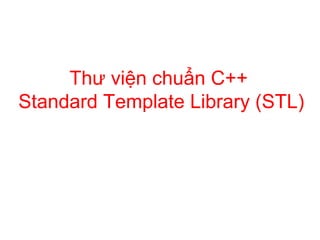
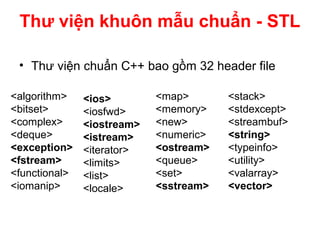
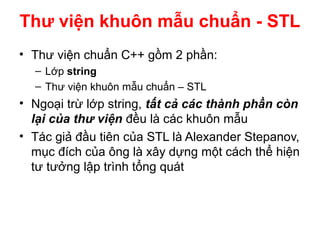
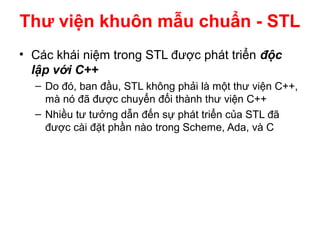
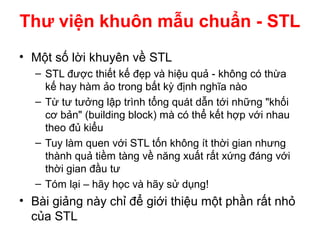
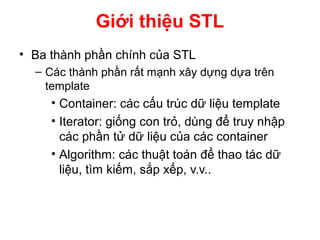





![Các phép toán đối với Iterator
• Input iterator
– ++ , =*p , -> , == , !=
• Output iterator
– ++ , *p= , p = p1
• Forward iterator
– Kết hợp các toán tử của input và output iterator
• Bidirectional iterator
– các toán tử cho forward, và --
• Random iterator
– các toán tử cho bidirectional, và
+ , +=, -, -=, >, >=, <, <=,[]](https://image.slidesharecdn.com/7-stlc-140717044336-phpapp02/85/7-stl-c-12-320.jpg)


![vector Sequence Container
• vector
– <vector>
– cấu trúc dữ liệu với các vùng nhớ liên tiếp
• truy nhập các phần tử bằng toán tử [ ]
– sử dụng khi dữ liệu cần được sắp xếp và truy nhập
dễ dàng
• Cơchế hoạt động khi hết bộ nhớ
– cấp phát một vùng nhớ liên lục lớn hơn
– tự sao chép ra vùng nhớ mới
– trả lại vùng nhớ cũ
• sử dụng randomaccess iterator](https://image.slidesharecdn.com/7-stlc-140717044336-phpapp02/85/7-stl-c-15-320.jpg)



![vector Sequence Container
• Các hàm thành viên của vector
– v.clear()
• Xóa toàn bộ container
– v.front(), v.back()
• Trả về phần tử đầu tiên và cuối cùng
– v.[elementNumber] = value;
• Gán giá trị value cho một phần tử
– v.at[elementNumber] = value;
• Như trên, nhưng kèm theo kiểm tra chỉ số hợp lệ
• có thể ném ngoại lệ out_of_bounds](https://image.slidesharecdn.com/7-stlc-140717044336-phpapp02/85/7-stl-c-19-320.jpg)

![1 // Fig. 21.14: fig21_14.cpp
2 // Demonstrating standard library vector class template.
3 #include <iostream>
4
5 using std::cout;
6 using std::cin;
7 using std::endl;
8
9 #include <vector> // vector class-template definition
10
11 // prototype for function template printVector
12 template < class T >
13 void printVector( const std::vector< T > &integers2 );
14
15 int main()
16 {
17 const int SIZE = 6;
18 int array[ SIZE ] = { 1, 2, 3, 4, 5, 6 };
19
20 std::vector< int > integers;
21
22 cout << "The initial size of integers is: "
23 << integers.size()
24 << "nThe initial capacity of integers is: "
25 << integers.capacity();
26
21
Tạo một vector chứa
các giá trị int
Gọi các hàm thành viên.](https://image.slidesharecdn.com/7-stlc-140717044336-phpapp02/85/7-stl-c-21-320.jpg)















![1 // Fig. 21.31: fig21_31.cpp
2 // Standard library search and sort algorithms.
3 #include <iostream>
4
5 using std::cout;
6 using std::endl;
7
8 #include <algorithm> // algorithm definitions
9 #include <vector> // vector class-template definition
10
11 bool greater10( int value ); // prototype
12
13 int main()
14 {
15 const int SIZE = 10;
16 int a[ SIZE ] = { 10, 2, 17, 5, 16, 8, 13, 11, 20, 7 };
17
18 std::vector< int > v( a, a + SIZE );
19 std::ostream_iterator< int > output( cout, " " );
20
21 cout << "Vector v contains: ";
22 std::copy( v.begin(), v.end(), output );
23
24 // locate first occurrence of 16 in v
25 std::vector< int >::iterator location;
26 location = std::find( v.begin(), v.end(), 16 );
37
fig21_31.cpp
(1 of 4)](https://image.slidesharecdn.com/7-stlc-140717044336-phpapp02/85/7-stl-c-37-320.jpg)






![38 int main()
39 {
40 const int SIZE = 10;
41 int array[] = { 1, 2, 3, 4, 5, 6, 7, 8, 9, 10 };
42
43 std::vector< int > integers( array, array + SIZE );
44
45 std::ostream_iterator< int > output( cout, " " );
46
47 int result = 0;
48
49 cout << "vector v contains:n";
50 std::copy( integers.begin(), integers.end(), output );
51
52 // calculate sum of squares of elements of vector integers
53 // using binary function sumSquares
54 result = std::accumulate( integers.begin(), integers.end(),
55 0, sumSquares );
56
57 cout << "nnSum of squares of elements in integers using "
58 << "binarynfunction sumSquares: " << result;
59
44
fig21_42.cpp
(3 of 4)
đầu tiên, accumulate
truyền 0 và phần tử
thứ nhất lần lượt làm
các tham số. Sau đó, nó
dùng kếtquả trả về làm
tham số thứ nhất, và lặp
qua các phần tử còn lại.](https://image.slidesharecdn.com/7-stlc-140717044336-phpapp02/85/7-stl-c-44-320.jpg)
